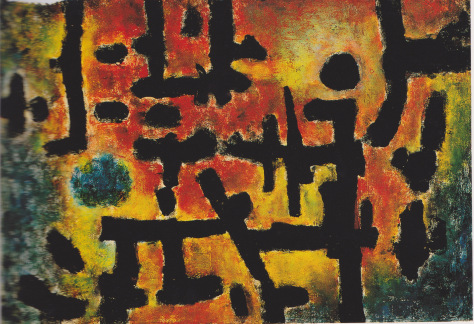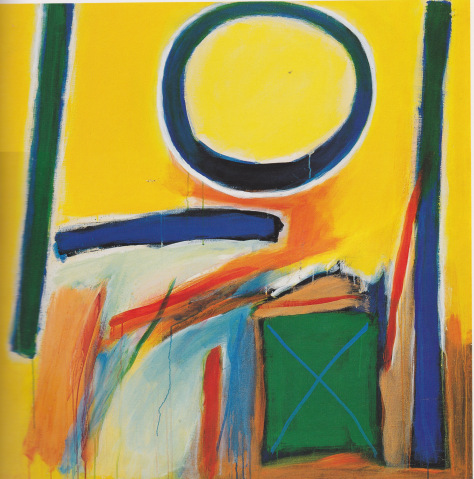Posted recently two poems and visual art works by Qin Song. Following up now with a bit more about him, and the project concerning Abstract expression I’ve got going. Qin was born in Anhui in 1932, and moved to Taiwan in ’49. He had a very successful career there in the 1950s, leading the modern printmaking movement (版畫), a work of which entitled “Sun Festival” (太陽節) gained him international acclaim. He was also the chair of the Modern Art Festival in 1966-1967.
At about the same time, he garnered attention of a wholly different sort, namely the ideological police of “Free China’s” ultra anti-left government. They found a single abstract image of his, a somewhat undulating red square, to be a reference to Chinese Communist Party. With that “discovery” they proceeded to find leftward leaning in anything he did, for instance the following “Spring View” (春望):
In fact this image was problematic for its containing the first character of Taiwan’s leader Chiang Kai-shek (蔣), only its rendered upside down, which “translates” to “dao” 倒, meaning also to “bring down” or end a period of power. Try as I might, I can’t seem to quite find the character in the image.
After constant pressure and what amounted to a blacklisting of his work, Qing left Taiwan in 1969, emigrating to New York where he lived until his death in 2007.
In his later years he was more a painter than a poet (or printmaker, which as mentioned in previous post was his main claim to fame in the 1960s). His works are abstract, and mostly acrylic on canvas. They are also marked by a single enduring theme, namely the relationship between circles and squares. Paraphrasing her observations, this basic dichotomy is very rich in associations:
circles
indicate nature, like seeds, suns, and moons; circles are primitive, emotional, timeless, and original.
Squares
are man-made, they are limited, rule-based, reasonable, and ideological, and occasionally dogmatic.
(抒情抽象繪畫 黃麗絹 行政院文化建設委員會, 2004)
Huang could go further with the same discussion, pushing back into Chinese philosophical tradition, namely the Yijing which includes discussion of the same dynamic (圓神方智), though with slightly more neutral (balanced) outcomes (–my thanks to Kiki Liu for this perspective). Regardless, with these oppositional scheme in mind, images do become more compelling:

